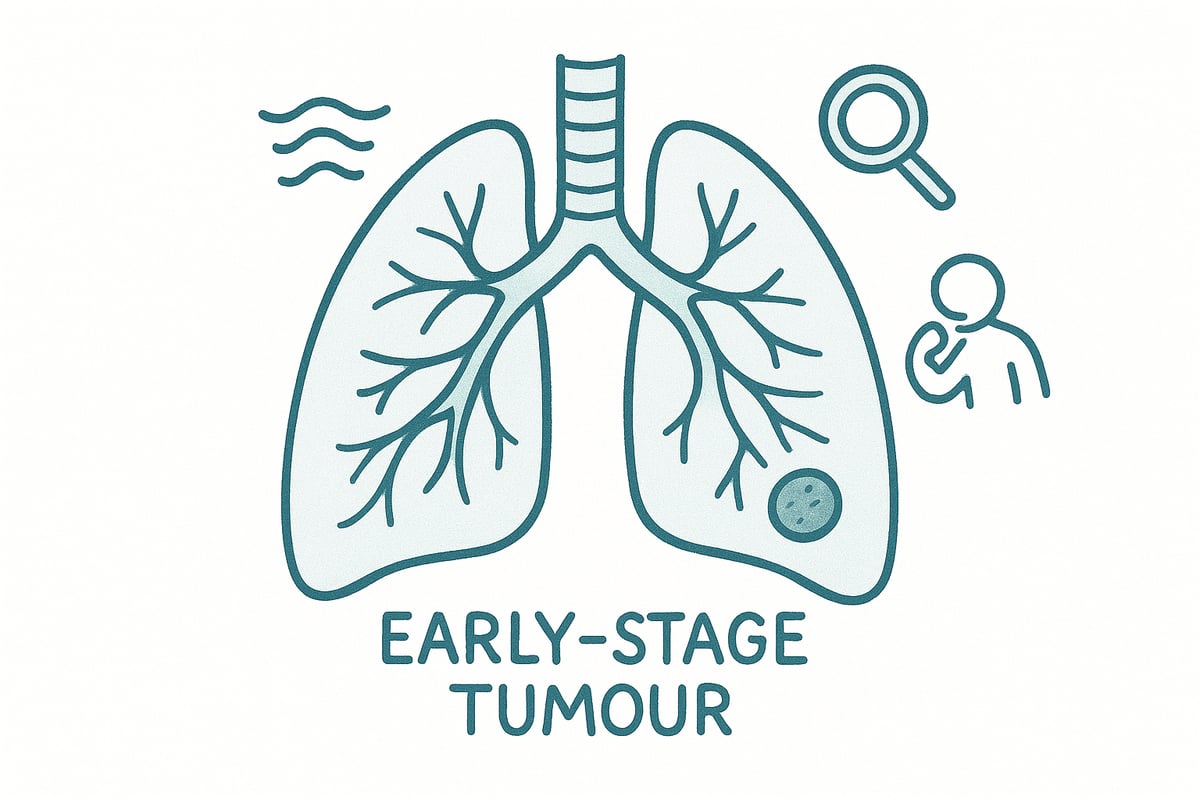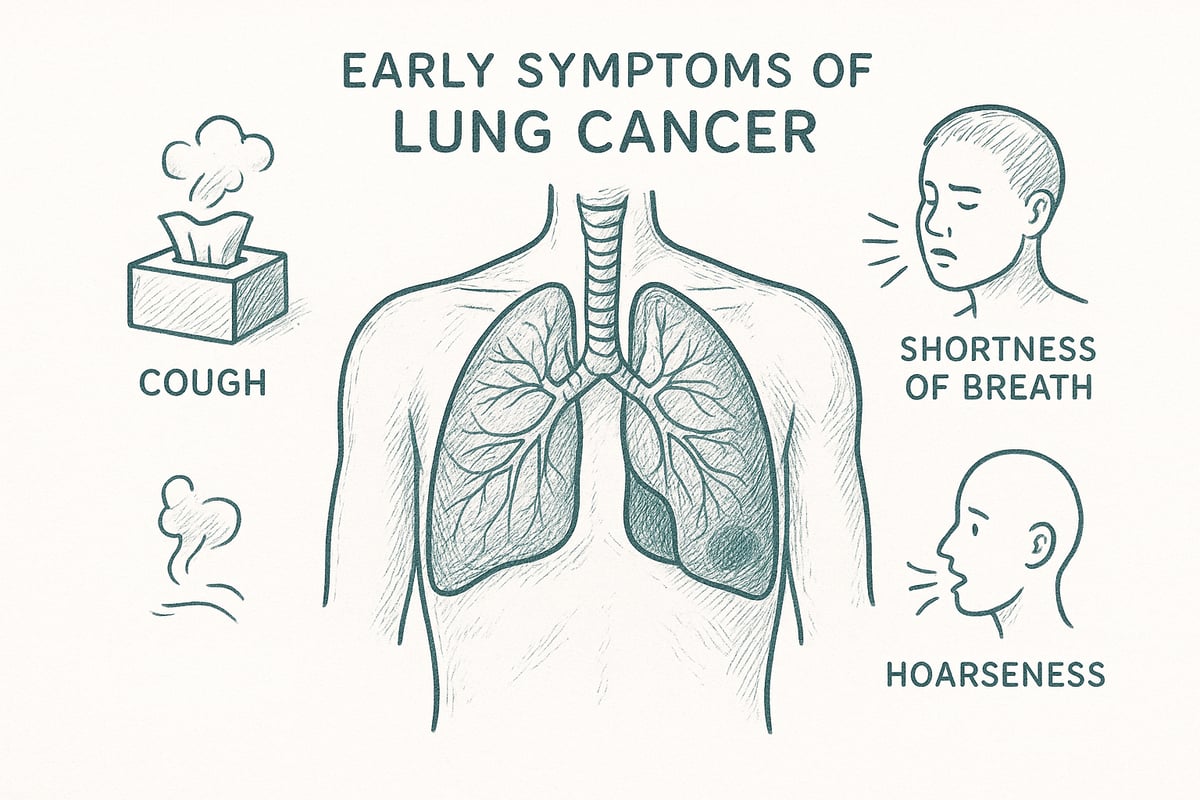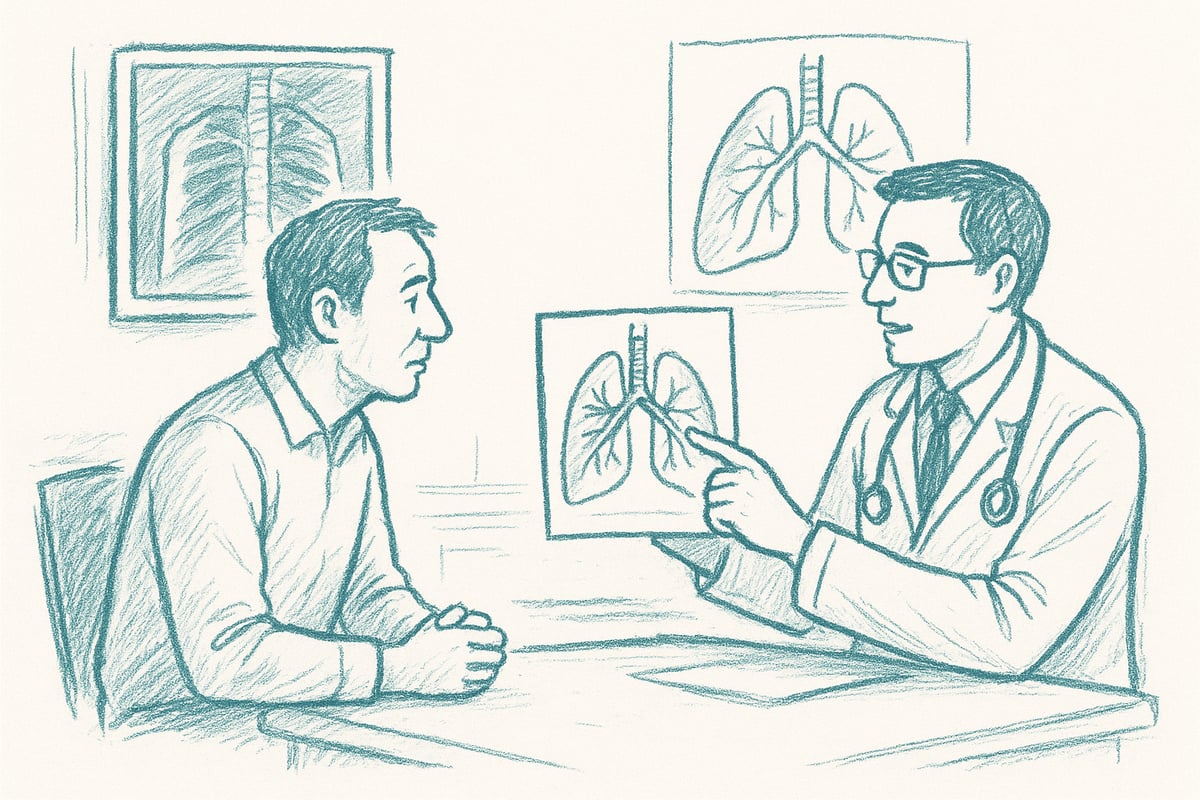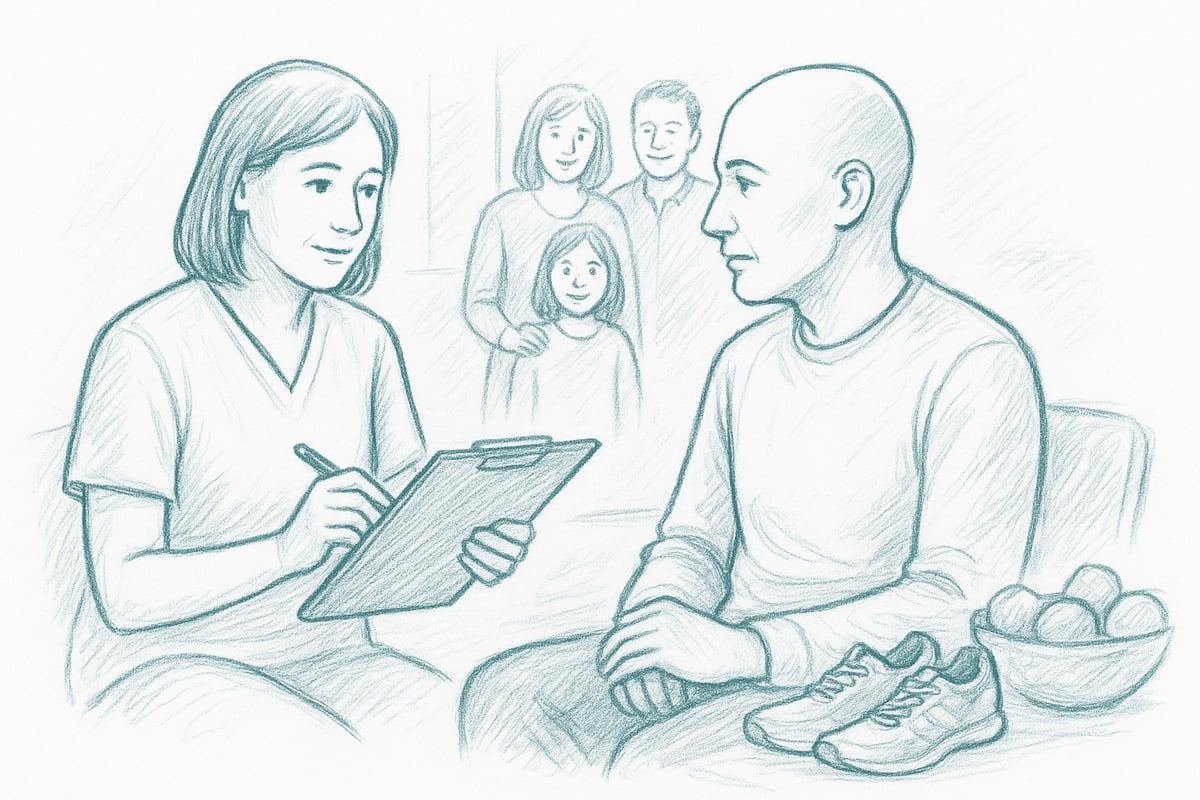Explore Effective Mental Health Support Strategies For Cancer Patients. Learn How To Cope And Manage Emotional Well-Being During And After Treatment.
Did you know that most lung cancer cases are not discovered until it is too late for the most effective treatment? Early detection can truly make the difference between life and death. This guide is here to help you understand 1st stage lung cancer symptoms, so you can spot the warning signs before they become serious.
Recognising 1st stage lung cancer symptoms early means more treatment options, a better prognosis, and a higher chance of recovery. We will walk you through the subtle signs to watch out for, explain who is at risk, outline how doctors diagnose early lung cancer, and share where to find support.
By the end of this guide, you will feel empowered to take charge of your lung health and help protect those you care about.
Lung cancer is a complex disease, and catching it early can make a real difference. Many people do not realise how subtle the signs can be at first. Understanding what happens in the earliest stage is the first step to recognising 1st stage lung cancer symptoms and taking action.

1st stage lung cancer means the cancer is small and has not spread beyond the lung where it started. Doctors use two main types to classify lung cancer: small cell lung cancer (SCLC) and non-small cell lung cancer (NSCLC). NSCLC is more common, and both types are staged using the TNM system, which looks at tumour size (T), lymph node involvement (N), and metastasis (M).
Most 1st stage lung cancers are found before symptoms become severe. At this point, treatment is often more effective, and the five-year survival rate is much higher compared to later stages. According to Cancer Research UK, around 60-80% of patients with stage 1 NSCLC survive five years or more after diagnosis. For more details on 1st stage lung cancer symptoms and survival statistics, see the Stage 1 Lung Cancer Symptoms and Survival Rates guide.
Spotting 1st stage lung cancer symptoms early is vital for the best possible outcome. When lung cancer is diagnosed at stage 1, treatments can be less aggressive and offer a better chance of full recovery. Unfortunately, many people overlook early warning signs because they can be mild or mistaken for other illnesses.
Only about 15% of lung cancers are caught at stage 1. Most are found at a later stage, when treatments become more difficult and survival rates drop. Early diagnosis means more treatment options and a greater chance of a cure. There are many cases where people who acted quickly on mild symptoms saw their survival and quality of life improve dramatically.
Anyone can develop 1st stage lung cancer symptoms, but some factors raise the risk. Smoking is the leading cause, but exposure to radon gas, asbestos, and other workplace chemicals also increases risk. Family history plays a role, as does age—most cases occur in people over 60. Men and women are both at risk, though rates can vary by gender and region.
Genetics and lifestyle choices matter too. Even non-smokers can develop lung cancer. In fact, about 10-15% of lung cancer cases are found in people who have never smoked. Environmental pollution and secondhand smoke also add to risk. For those with increased risk, regular screening and being aware of 1st stage lung cancer symptoms is crucial for early detection and peace of mind.
Spotting 1st stage lung cancer symptoms early can make a real difference in treatment success. Many people overlook these early signs, mistaking them for minor issues. Knowing what to look for helps you act quickly and seek the right support.

Many early 1st stage lung cancer symptoms are mild, which makes them easy to brush off. The most common is a persistent cough that lasts for several weeks or changes from your usual cough. Unlike a cough from a cold, this one lingers and may get slightly worse over time.
Shortness of breath is another sign. You might notice you get winded going up stairs or walking short distances. Mild wheezing can appear without any clear reason, even if you have never had asthma.
Chest pain or discomfort is often mild in the early stages. It might come and go, or you may feel a dull ache that you cannot explain. Hoarseness or changes in your voice can also be an early indicator, especially if it lasts more than a few weeks.
People sometimes mistake these 1st stage lung cancer symptoms for a lingering chest infection or allergies. For example, one patient shared that she ignored her cough for months, thinking it was due to the weather. Unlike a cold, these symptoms do not fully disappear and may slowly worsen.
It is important to notice when these symptoms do not improve, as catching 1st stage lung cancer symptoms early gives you the best chance of successful treatment.
Some 1st stage lung cancer symptoms are less obvious and may not seem related to your lungs at all. Recurrent respiratory infections, such as bronchitis or mild pneumonia, can be a warning sign, especially if they happen more than usual in a short period.
Unexplained weight loss or ongoing fatigue are also signals to watch for. You may notice your clothes feel looser, or you feel tired even after resting well. Mild pain in the shoulder or back, which does not seem to have a clear cause, can also appear in some people.
Rarely, you might cough up small amounts of blood, a symptom called haemoptysis. Clubbing of the fingers, where the fingertips become rounder or wider, is unusual in the early stage but still possible.
According to NHS data, these symptoms are less common but can be present in early lung cancer cases. Spotting them, especially alongside more typical symptoms, can help you recognise 1st stage lung cancer symptoms sooner.
If you notice these symptoms together or alongside others, it is time to take action.
It is crucial not to dismiss 1st stage lung cancer symptoms, even if they seem mild or unrelated. If you experience a cough lasting more than three weeks, unexplained breathlessness, chest pain, or any of the symptoms listed above, contact your GP promptly. Do not wait for symptoms to worsen or hope they will go away on their own.
The average time from first noticing symptoms to receiving a diagnosis can vary, so acting quickly helps improve outcomes. According to NHS guidelines, if your symptoms persist or you feel concerned, do not hesitate to seek medical advice.
When you talk to your GP, clearly describe what you are experiencing, how long it has lasted, and if anything has changed. For more detailed information and support on recognising 1st stage lung cancer symptoms and what steps to take, visit the Lung cancer guides and resources.
Remember, being proactive can make all the difference in your health.
Detecting 1st stage lung cancer symptoms early can greatly improve your chances of effective treatment. Understanding how the diagnostic process works can help you feel more prepared and empowered as you take the next steps.

If you notice 1st stage lung cancer symptoms, your first step is usually a visit to your GP. During this appointment, your doctor will ask detailed questions about your symptoms, such as how long they have lasted and whether you have noticed any changes.
Expect your GP to review your medical history, including smoking habits, exposure to potential carcinogens, and any family history of cancer. A physical examination may follow, focusing on your chest and breathing.
Basic tests, like measuring your oxygen levels or listening to your lungs, help guide next steps. If your GP suspects 1st stage lung cancer symptoms, they will arrange for further investigations. In the UK, a typical pathway includes a rapid referral for imaging or specialist assessment to avoid delays.
Once 1st stage lung cancer symptoms prompt further checks, imaging tests are usually the next step. The first test is often a chest X-ray, which can reveal suspicious areas in the lungs. If anything unusual is found, a CT scan provides more detailed images, helping to pinpoint the location and size of any tumours.
Advanced imaging, such as PET scans, may be used to assess whether cancer has spread. Sometimes, doctors collect samples of sputum (mucus) or perform a bronchoscopy to view the airways directly. A biopsy, where a small tissue sample is taken, confirms the diagnosis.
Here’s a quick comparison of common tests:
| Test | Purpose |
|---|---|
| Chest X-ray | Initial screening for abnormalities |
| CT scan | Detailed images of lung structures |
| PET scan | Checks for cancer spread |
| Bronchoscopy | Visualises airways, collects samples |
| Biopsy | Confirms cancer type and stage |
The process from referral to diagnosis can take a few weeks, depending on test results and availability.
If 1st stage lung cancer symptoms are confirmed, doctors need to determine how far the cancer has spread. This is called staging and involves additional tests, such as lymph node assessment or a mediastinoscopy, which examines tissue between the lungs.
Blood tests and lung function tests help assess your overall health before treatment. A multidisciplinary team (MDT) of specialists will review your case to plan the best course of action.
Accurate staging is crucial, as it influences which treatments are most effective. For a comprehensive explanation of how staging works and why it matters, see the Lung Cancer Staging Overview.
Knowing the stage not only helps guide treatment decisions but also gives you a clearer idea of what to expect as you move forward. Prompt and accurate diagnosis of 1st stage lung cancer symptoms can make a significant difference in recovery and long-term outlook.
Adjusting to life after discovering 1st stage lung cancer symptoms can feel overwhelming, but many people find hope and strength through early diagnosis. Understanding what lies ahead empowers you to make informed choices about treatment, support, and long-term health.

When 1st stage lung cancer symptoms lead to diagnosis, the main goal is to achieve a cure with minimal impact on your quality of life. Most patients are offered surgery, which may involve removing a section of the lung (lobectomy, segmentectomy, or wedge resection). Surgery offers the best chance of complete removal, with five-year survival rates significantly higher at this stage than in later stages.
If surgery is not suitable, stereotactic ablative radiotherapy (SABR) is a non-invasive option that targets tumours precisely. Some people may receive adjuvant treatments, such as chemotherapy or immunotherapy, but these are less common in stage 1 unless there is a high risk of recurrence.
Recovery after treatment varies. Many return to normal activities within weeks, while others need more time to regain strength. Discussing 1st stage lung cancer symptoms with your team helps tailor your treatment plan and manage expectations. Survival outcomes are encouraging, with early intervention offering the best chance for a positive future.
Facing 1st stage lung cancer symptoms can bring a mix of emotions, from anxiety to relief. It is normal to feel uncertain or overwhelmed. Support from family, friends, and cancer support groups can make a meaningful difference. Many people benefit from joining local or online communities to share experiences and advice.
Counselling services and mental health support are available to help you process your feelings and adjust to changes in your daily life. For practical advice and emotional reassurance, explore these Living with cancer support tips, which offer guidance on managing challenges and building resilience.
Patient stories often highlight the importance of reaching out and not facing 1st stage lung cancer symptoms alone. Support networks provide encouragement every step of the way.
After experiencing 1st stage lung cancer symptoms, making healthy lifestyle adjustments is vital for recovery and long-term wellbeing. If you smoke, quitting is the most important change you can make. A balanced diet and regular physical activity support healing and boost energy.
Routine follow-up appointments are essential. Your healthcare team will monitor for any signs of recurrence and guide you through your recovery journey. The NHS typically recommends regular scans and check-ups during the first few years after treatment.
For more guidance on healthy habits and staying well, consult this Cancer health and wellbeing advice, which covers nutrition, exercise, and self-care tips tailored to people living with 1st stage lung cancer symptoms.
Catching 1st stage lung cancer symptoms early gives you the best chance at a positive outcome, but looking after your health does not stop there. Proactive steps can help prevent the cancer from progressing and keep your lungs as healthy as possible. By following recommended treatments, making lifestyle changes and connecting with support, you can take control of your journey.
Managing 1st stage lung cancer symptoms means staying alert to any changes and following your treatment plan closely. Attend all scheduled appointments and keep up with scans or blood tests as recommended.
If you notice new or worsening symptoms, such as increased cough or breathlessness, tell your healthcare team right away. These could signal a change in your condition. Regular check-ups are vital for monitoring your health and catching any recurrence early.
Research shows that people with 1st stage lung cancer symptoms who follow their care plan and report changes promptly have improved outcomes. Recurrence rates are lower when you stay engaged with your care team and act quickly if symptoms shift.
Lifestyle changes can make a real difference in your recovery and long-term lung health. If you smoke, quitting is the single most important step you can take. Seek out support groups or NHS stop smoking services for help. Avoid places with high air pollution or exposure to harmful chemicals, like radon or asbestos.
Eating a balanced diet and staying active help your body heal and keep your immune system strong. Doctors recommend regular exercise tailored to your ability. Vaccinations, such as the flu jab and pneumonia vaccine, are also important for those with 1st stage lung cancer symptoms.
According to the Lung Cancer Fact Sheet, healthy habits can improve quality of life and may reduce the risk of the cancer returning.
No one should face 1st stage lung cancer symptoms alone. National organisations like Macmillan and the Roy Castle Lung Cancer Foundation offer a wealth of information and practical advice. Online forums provide a safe space to share experiences and ask questions.
Look for local support groups where you can meet others who understand what you are going through. Educational resources, such as Lung cancer awareness month insights, help you stay informed and empowered.
Connecting with others and accessing support can ease anxiety and help you feel more in control as you manage your health.
Now that you’ve learned how crucial it is to spot the early signs of 1st stage lung cancer and why acting quickly can make all the difference, remember you’re not alone on this journey. At Cancer Care Parcel, we believe everyone deserves trusted information and a supportive community when facing a diagnosis. If you’d like to make a real impact and help us continue providing practical resources and emotional support to those affected by cancer, you can Donate. Every contribution helps us reach more people with the care and understanding they truly need.

In a world full of conflicting and sometimes misleading information about cancer, Cancer Care Parcel stands out by offering resources backed by solid facts. Funded entirely by the sale of our products and donations, we ensure that every resource on our site is accurate, trustworthy, and focused on supporting the cancer community.
Founded by Dr Shara B.A. Cohen, PhD, CBiol, FWIF, FRCPath, FIBMS, FRSB, BEM, Cancer Care Parcel provides trusted information, a freebies directory, and a library of live and on-demand webinars for patients, families, and caregivers. The organisation also gives away free care packages to those in need, made possible through the generosity of donors and supporters. Every purchase or contribution helps us deliver comfort, education, and a sense of calm to people affected by cancer.
Discover How Marine-Derived Compounds Inspire Innovative Cancer Treatments From The Depths Of The Ocean
Cancer Care Parcel is delighted to report on their ongoing cancer charity collaboration with Ellies Friends, who provide free gifts to people with cancer.
This Article Highlights Some Common Chemo Side Effects With Tips On Overcoming And Coping With Issues Should They Arise.